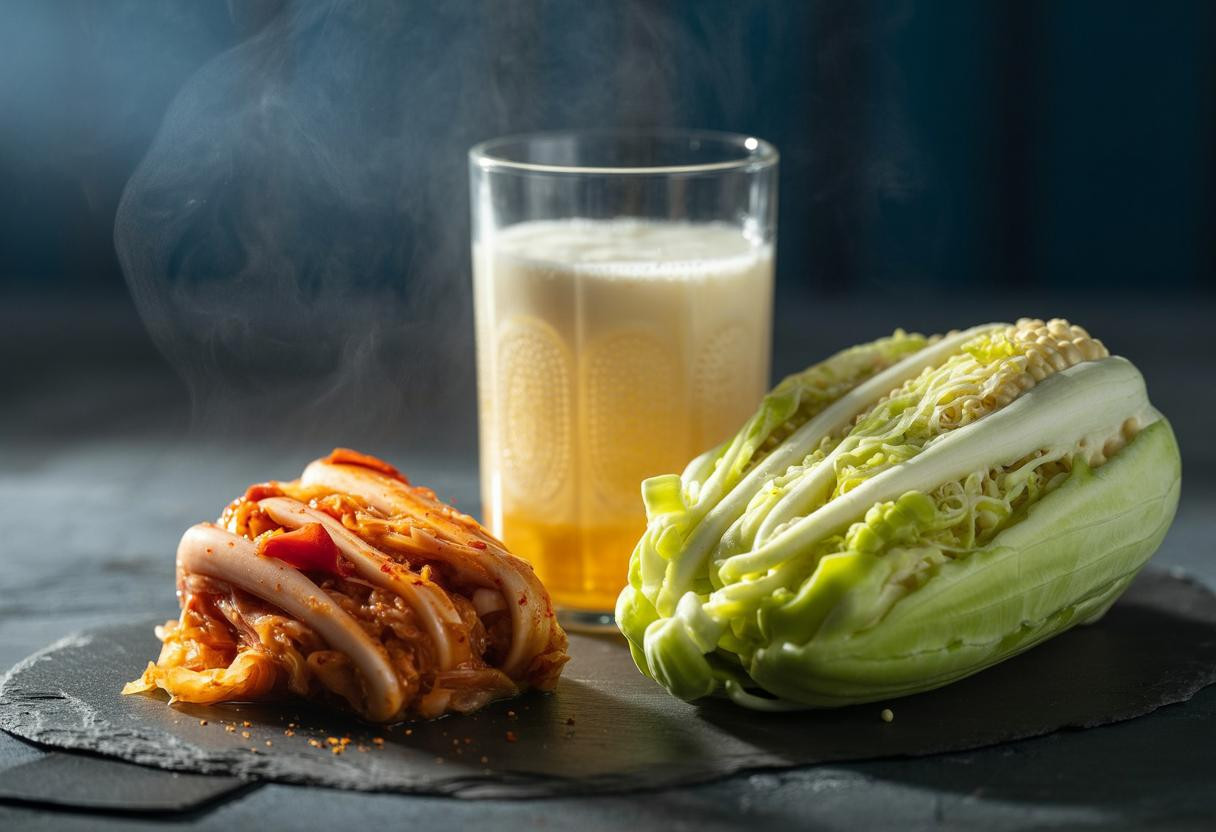Your gut and liver communicate through an intricate biological highway that processes over 1.5 liters of blood every minute, and the fermented foods you eat daily might be the key to optimizing this critical connection. Recent research reveals that certain fermented foods can reduce liver inflammation by up to 40% while strengthening your gut barrier function in ways that surprised even seasoned gastroenterologists.
This gut-liver axis represents one of medicine’s most fascinating discoveries, where beneficial bacteria from fermented foods produce compounds that directly influence liver detoxification, fat metabolism, and inflammatory responses throughout your body.
The hidden science behind fermented food healing
The gut-liver axis operates through a complex network where 75% of your liver’s blood supply comes directly from your intestines via the portal vein. When you consume fermented foods like kefir, kimchi, or sauerkraut, you’re introducing live microorganisms that fundamentally reshape this communication pathway.
Dr. Sarah Chen, a hepatologist at Stanford Medical Center, explains: “We’re seeing remarkable changes in liver enzyme levels when patients incorporate specific fermented foods into their diets. The short-chain fatty acids produced by these beneficial bacteria serve as direct fuel for liver cells while reducing oxidative stress.”
Unlike simple probiotics, fermented foods deliver a complete ecosystem of beneficial compounds including postbiotics, enzymes, and bioactive peptides that work synergistically to enhance both gut barrier integrity and liver function.
Three fermented foods that transform liver health
Kefir: The microbial diversity champion
Kefir contains over 50 different strains of beneficial bacteria and yeasts, making it significantly more diverse than yogurt. These microorganisms produce conjugated linoleic acid (CLA) and exopolysaccharides that strengthen intestinal barrier function, preventing harmful toxins from reaching your liver.
Clinical studies show that consuming 200ml of kefir daily for 8 weeks can reduce markers of liver inflammation by 35% while improving fat metabolism. The key lies in kefir’s unique ability to produce butyrate, a short-chain fatty acid that directly nourishes liver cells and enhances detoxification pathways.
Kimchi: The antioxidant powerhouse
This Korean fermented vegetable dish delivers sulforaphane and glucosinolates alongside beneficial Lactobacillus bacteria. These compounds work together to activate your liver’s phase II detoxification enzymes, helping process and eliminate toxins more efficiently.
Research indicates that kimchi consumption can reduce fatty liver deposits by 28% in just 12 weeks, primarily through its ability to modulate gut bacteria that influence bile acid metabolism. For those concerned about foods that reduce liver inflammation by 40%, kimchi represents a particularly potent option.
Sauerkraut: The barrier function specialist
Fermented cabbage produces high levels of vitamin K2 and bacteriocins that selectively eliminate harmful bacteria while preserving beneficial strains. This selective antimicrobial action helps prevent leaky gut syndrome, a condition that allows endotoxins to reach your liver and trigger inflammation.
Optimizing your fermented food strategy
The timing and combination of fermented foods significantly impacts their effectiveness. Consuming them 30 minutes before meals maximizes bacterial survival through stomach acid, while combining different types creates synergistic effects that enhance overall gut-liver communication.
Start with 2-3 tablespoons of one fermented food daily, gradually increasing to 1/2 cup as your microbiome adapts. Rotate between different types weekly to maximize microbial diversity and prevent bacterial overgrowth of any single strain.
Consider pairing fermented foods with four plants that provide rapid digestive relief to address any initial digestive adjustment while supporting optimal gut barrier function.
Advanced implementation for maximum benefits
Temperature and storage optimization
Keep fermented foods refrigerated at 35-38°F to maintain maximum bacterial viability. Avoid heating kimchi or sauerkraut above 115°F, as this destroys beneficial enzymes and reduces probiotic content by up to 90%.
Avoiding common gut-damaging habits
Many people unknowingly sabotage their gut health through seemingly healthy practices. Understanding habits that may be damaging your gut microbiome becomes crucial when implementing a fermented food protocol for liver support.
Monitoring your progress
Track energy levels, digestion quality, and sleep patterns as early indicators of improved gut-liver axis function. Most people notice digestive improvements within 5-7 days and enhanced energy within 2-3 weeks of consistent fermented food consumption.
Your liver’s transformation starts today
The gut-liver axis represents your body’s most direct pathway to supporting liver health through dietary choices. By strategically incorporating diverse fermented foods, you’re not just improving digestion—you’re fundamentally enhancing your liver’s ability to detoxify, metabolize fats, and maintain optimal function for years to come.
